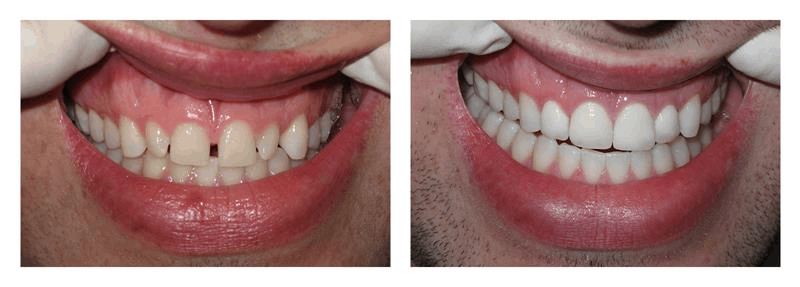There are several reasons why a smile can be less than perfect, from age and heredity to lifestyle choices and accidents. If you’re looking for an easier way to brighten your smile for good, dental veneers may be a good fit for you.
What are Dental Veneers?
Dental veneers are thin, tooth-coloured shells that are attached to the front surface of teeth to improve their appearance. They’re often made from porcelain or resin composite materials and are permanently bonded to your teeth. Veneers can be used to treat a number of different cosmetic concerns, including chipped, broken, discoloured, or smaller-than-average teeth.
Types of Dental Veneers:
- Porcelain Veneers
- Composite Resin Veneers
What is the Difference Between Porcelain and Composite Veneers?
Porcelain veneers are thin shells of porcelain adhered to the outer surface of the tooth. Composite veneers are engineered resin affixed to the outer surface. Both are made to match your teeth (or whiten) and improve your overall smile. Porcelain veneers are stronger than composite resin veneers and do not change colour or stain. Generally, porcelain veneers take at least 2 dental visits to apply and composite resin veneers can be done in 1 visit. Porcelain veneers generally last longer than composite resin veneers.

How Are Dental Veneers Applied?
Depending on the condition of your teeth, some preparation may be needed before the veneers can be applied. Usually, about half a millimetre of enamel will be removed so the veneers can fit comfortably within your mouth. A local anaesthetic can be used if needed.
Once the teeth are prepared, your dentist will make an impression of your teeth and send it to a dental laboratory for the veneers to be created. In the meantime, temporary veneers can be placed on the teeth. After a week or two, your veneers should be back from the lab.
Your dentist will then thoroughly clean your teeth. This is important because it keeps bacteria from being trapped under the veneer and causing decay. After, they use a grinding tool to create a rough texture on each tooth on which a veneer is to be applied. This makes it easier for the veneer to stick to the tooth. Your dentist will then remove any excess cement, check the bite, and make any necessary adjustments.
Should I Get Dental Veneers?
Not everyone is a suitable candidate for veneers. Here are some reasons why your dentist may suggest treatments other than veneers:
- If a person grinds or clenches his or her teeth. This habit can chip or break porcelain veneers.
- If a tooth has decay or is in an area that has gum disease.
- If too much of the tooth is missing, a crown may be another option.
- If a tooth has little enamel left, a veneer will not stick to it properly.
How Much Do Dental Veneers Cost?
In Canada, you can expect to pay anywhere between $500 to $2000 for a single veneer. The cost is dependent on:
- Type of veneer material used
- The experience and hourly rate of the service provider
- Number of veneers needed
- Dental insurance or health plans
Above all else, it is best to find a trusted and certified professional. Contact Dr. Vlahos at (905)-937-4673 to book an appointment to see if dental veneers are the right solution for you!